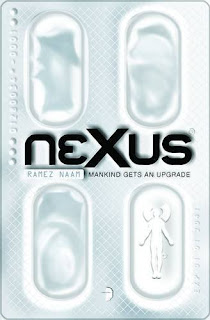Nexus Review


First geeky review of the year! And it's quite a doozy, I must admit.
Nexus is another book that I had an opportunity to read thanks to Angry Robot Books' Angry Robot Army program, which has now shifted over to NetGalley. I wish that I had read this book sooner in order to release a pre-publish date review, but you know how busy geeks are. And I tend to juggle around 3-4 books at any one time with respect to my reading queue.
It's rare that I come across a book with such a thought-provoking premise. And I suppose it makes sense since the author is quite the technologist and futurist and thus thinking ahead with regard to mankind's future is pretty much his area of expertise.
I have to admit that I do enjoy when scientists and similar experts venture into the worlds of fiction writing. While they aren't necessarily consistently creative in their writing approach, they do present some interesting scenarios for us science fiction enthusiasts to enjoy and pick apart. And this is definitely a book that gives us a lot to work with.
Synopsis: Nexus is the debut novel of Ramez Naam, a technologist and a man who contributed to the development of products like Microsoft Internet Explorer and Outlook. In 2005 he was the recipient of the HG Wells Award for Contributions to Transhumanism by the World Transhumanist Association.
The world of Nexus is one that lives in fear of several emerging technologies that threaten to change many things about human society. The most recent threat is a drug known as Nexus, which allows people to link minds to one another. Similar drugs have been used to create sex slaves or to turn other people into virtual zombies with no will of their own.
But graduate student Kaden Lane and his peers have some very different ideas for Nexus. They've manged to create a stable variant of Nexus that has allowed them to develop some sort of operating system that works through the drug. With the Nexus OS in place, one can run various "programs" that provide new skills to the user such as combat abilities or even seduction routines beyond the basic telepathic abilities. And naturally the authorities won't be pleased at all should their experiments be discovered.
A lot of what makes Nexus work as a novel is the fact that this isn't exactly the distant future. There are a lot of similarities between Naam's future and the present day. We have the threats that various governments recognize - the international condemnation of drug use isn't exactly a new idea after all. And you have the various liberties that are given up in exchange for protection from major threats. Today's terrorism is tomorrow's post-human threats.
An interesting central theme in the book involves the question of what it means to be human and how far should we allow technology to push us forward. In a modern context, we do live much longer lives due to advances in medical technology. Mobile phones and the internet allow us to communicate in ways that were not available 100 years ago. So who is to say when technology stops being a mere innovation and becomes a line crossed in terms of creating technologies that are far too dangerous.
And that's what Nexus really challenges us with - the notion of when technology can push humanity forward in a sort of forced evolution. If a technology like the Nexus drug could make us communicate with the power of our minds, allow us to access the internet mentally and even augment out skills. Who is to say that this is not something that the greater segment of humanity can't benefit from? Or should we only think of the negative applications of these technologies and the potential risks they post. Just look at the way that we regular nuclear technology today, out of fear that other countries will create nuclear weapons.
Our protagonist, Kaden Lane, is rather naive at first, but over the course of the book he becomes exposed to different philosophies regarding emerging technologies and how they should be regulated or used. Thus it's the classic role of the reader placing himself in the mind of the protagonist and thus we too learn different perspectives on dealing with technology. And like Kaden, we eventually have to choose for ourselves which perspective makes the most sense to us and how we want to move forward in life as technology advances as well.
Given Nexus was written by a futurist as well, it's clear that there is a definite slant towards some of the more idealistic notions of the scientific community with regard to the neutrality of technology and thus free access is the best solution instead of control. And whether or not this is the best course of action is something that is not (and should not be) definitively answered in the course of Kaden's high-stakes adventure. But it does make for a most compelling story and one that deserves a solid rating of 4.5 demonstrations of "posthuman" technologies out of a possible 5.